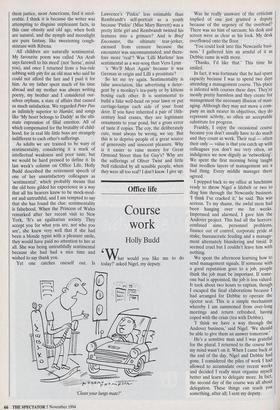Office life
Course work
Holly Budd
hat would you like me to do today?' asked Nigel, my deputy.
`Clean your lungs mate?' Was he really unaware of the criticism implied of one just granted a deputy because of the urgency of the overload? There was no hint of sarcasm; his desk and screen were as clear as his look. My desk overflowed onto the floor.
`You could look into this Newcastle busi- ness.' I gathered him an armful of it as Debbie came in with more.
`Thanks, I'd like that.' This time he smiled.
In fact, it was fortunate that he had spare capacity because I was to spend two days attending a management course. This place is infested with courses these days. They're mostly pretty harmless and they create for management the necessary illusion of man- aging. Although they may not move a com- pany an inch nearer its objectives, they do represent activity, so often an acceptable substitute for progress.
Frankly, I enjoy the occasional course because you don't usually have to do much and they count as work. Their real — often their only — value is that you catch up with colleagues you don't see very often, an indulgence we now dignify as 'networking'. We spent the first morning being taught that needless layers of management are a bad thing. Every middle manager there agreed.
I popped back to my office at lunchtime ready to throw Nigel a lifebelt or two to drag him through the Newcastle business. `I think I've cracked it,' he said. This was serious. To my shame, the awful mess had been hanging over me for weeks. Impressed and alarmed, I gave him the Andover project. This had all the horrors: confused aims, personnel problems, finance out of control, corporate pride at stake, bureaucratic feuding and a manage- ment alternately blundering and timid. It seemed cruel but I couldn't leave him with nothing.
We spent the afternoon learning how to send management signals. If someone with a good reputation goes to a job, people think the job must be important. If some- one bad is appointed, the job is less valued. It took about two hours to explain, though I escaped the final elaborations because I had arranged for Debbie to operate the ejector seat. This is a simple mechanism whereby I am summoned from over-long meetings and return refreshed, having coped with the crisis (tea with Debbie).
`I think we have a way through the Andover business,' said Nigel. 'We should be able to give them an answer tomorrow.' He's a sensitive man and I was grateful for the plural. I returned to the course but my mind wasn't on it. When I came back at the end of the day, Nigel and Debbie had gone. I considered the piles of work I had allowed to accumulate over recent weeks and decided I really must organise myself better and learn to delegate more. In fact, the second day of the course was all about delegation. These things can teach you something, after all; I sent my deputy.










































































 Previous page
Previous page